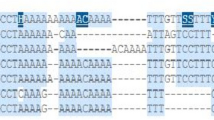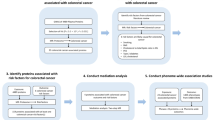Abstract
Purpose
Previous studies investigating the association between X-ray repair cross-complementation group 1 (XRCC1) polymorphisms and colorectal cancer (CRC) risk has provided inconsistent results. The aim of our study was to clarify the effects of XRCC1variants on CRC risk.
Materials and methods
We conducted searches of the published literature in PubMed, Embase, and CBM databases up to July 6, 2009. Meta-analysis was performed by critically reviewing 14 studies with a total of 2,776 CRC cases and 4,402 controls on Arg399Gln polymorphism, four studies with a total of 931 CRC cases and 1,547 controls on Arg280His polymorphism, and nine studies with a total of 1,709 CRC cases and 3,233 controls on Arg194Trp polymorphism, respectively. Statistical analysis was performed with the software programs Review Manager (version 5.0.10) and STATA (version 9.2).
Results
No significant association between Arg399Gln polymorphism and CRC risk was observed in both total population analyses and subgroup analyses based on ethnicity (ORCo-dominant model = 1.04, 95% CI 0.74–1.45, P OR = 0.82; ORDominant model = 1.02, 95% CI 0.80–1.30, P OR = 0.88; OR Recessive model = 1.04, 95% CI 0.81–1.34, P OR = 0.78). Arg280His polymorphism also had no significant association with CRC risk (ORCo-dominant model = 0.85, 95% CI 0.32–2.31, P OR = 0.76; ORDominant model = 1.11, 95% CI 0.87–1.40, P OR = 0.40; ORRecessive model = 0.85, 95% CI 0.32–2.31, P OR = 0.75). Besides, there was also no evidence of association between Arg194Trp polymorphism and CRC risk (ORCo-dominant model = 1.43, 95% CI 0.83–2.48, P OR = 0.20; ORDominant model = 1.14, 95% CI 0.87–1.51, P OR = 0.34; ORRecessive model = 1.32, 95% CI 0.82–2.13, P OR = 0.25).
Conclusions
No association is found between the polymorphisms in XRCC1 (Arg399Gln, Arg280His, and Arg194Trp) and risk of colorectal cancer.





Similar content being viewed by others
References
Jemal A, Siegel R, Ward E, Hao Y, Xu J, Thun MJ (2009) Cancer statistics. CA Cancer J Clin 59:225–249
Parkin DM, Bray F, Ferlay J, Pisani P (2005) Global cancer statistics, 2002. CA Cancer J Clin 55:74–108
Grady WM, Carethers JM (2008) Genomic and epigenetic instability in colorectal cancer pathogenesis. Gastroenterology 135:1079–1099
Lichtenstein P, Holm NV, Verkasalo PK et al (2000) Environmental and heritable factors in the causation of cancer—analyses of cohorts of twins from Sweden, Denmark, and Finland. N Engl J Med 343:78–85
Almeida KH, Sobol RW (2007) A unified view of base excision repair: lesion-dependent protein complexes regulated by post-translational modification. DNA Repair (Amst) 6:695–711
Das A, Wiederhold L, Leppard JB et al (2006) NEIL2-initiated, APE-independent repair of oxidized bases in DNA: evidence for a repair complex in human cells. DNA Repair (Amst) 5:1439–1448
Campalans A, Marsin S, Nakabeppu Y, O’connor TR, Boiteux S, Radicella JP (2005) XRCC1 interactions with multiple DNA glycosylases: a model for its recruitment to base excision repair. DNA Repair (Amst) 4:826–835
Vidal AE, Boiteux S, Hickson ID, Radicella JP (2001) XRCC1 coordinates the initial and late stages of DNA abasic site repair through protein–protein interactions. EMBO J 20:6530–6539
Cochran WG (1954) The combination of estimates from different experiments. Biometrics 10:101–129
Higgins JP, Thompson SG, Deeks JJ, Altman DG (2003) Measuring inconsistency in meta-analyses. BMJ 327:557–560
Wang D, Mou ZY, Zhai JX, Zong HX, Zhao XD (2008) Application of Stata software to test heterogeneity in meta-analysis method. Zhonghua Liu Xing Bing Xue Za Zhi 29:726–729 [Article in Chinese]
Galbraith RF (1988) A note on graphical presentation of estimated odds ratios from several clinical trials. Stat Med 7:889–894
Mantel N, Haenszel W (1959) Statistical aspects of the analysis of data from retrospective studies of disease. J Natl Cancer Inst 22:719–748
DerSimonian R, Laird N (1986) Meta-analysis in clinical trials. Control Clin Trials 7:177–188
Egger M, Davey Smith G, Schneider M, Minder C (1997) Bias in meta-analysis detected by a simple, graphical test. BMJ 315:629–634
Berndt SI, Huang WY, Fallin MD et al (2007) Genetic variation in base excision repair genes and the prevalence of advanced colorectal adenoma. Cancer Res 67:1395–1404
Stern MC, Siegmund KD, Corral R, Haile RW (2005) XRCC1 and XRCC3 polymorphisms and their role as effect modifiers of unsaturated fatty acids and antioxidant intake on colorectal adenomas risk. Cancer Epidemiol Biomarkers Prev 14:609–615
Stern MC, Siegmund KD, Conti DV, Corral R, Haile RW (2006) XRCC1, XRCC3, and XPD polymorphisms as modifiers of the effect of smoking and alcohol on colorectal adenoma risk. Cancer Epidemiol Biomarkers Prev 15:2384–2390
Jin MJ, Liu B, Zhang SS et al (2008) Application of multifactor dimensionality reduction on the interactions between gene–gene, gene–environment and the risk sporadic colorectal cancer in Chinese population. Zhonghua Liu Xing Bing Xue Za Zhi 29:535–539 [Article in Chinese]
Gaustadnes M, Ørntoft TF, Jensen JL, Torring N (2006) Validation of the use of DNA pools and primer extension in association studies of sporadic colorectal cancer for selection of candidate SNPs. Hum Mutat 27:187–194
Mort R, Mo L, McEwan C, Melton DW (2003) Lack of involvement of nucleotide excision repair gene polymorphisms in colorectal cancer. Br J Cancer 89:333–337
Yeh CC, Sung FC, Tang R, Chang-Chieh CR, Hsieh LL (2005) Polymorphisms of the XRCC1, XRCC3, & XPD genes, and colorectal cancer risk: a case-control study in Taiwan. BMC Cancer 5:12–19
Yeh CC, Hsieh LL, Tang R, Chang-Chieh CR, Sung FC (2005) MS-920: DNA repair g ene polymorphisms, diet and colorectal cancer risk in Taiwan. Cancer Lett 224:279–288
Improta G, Sgambato A, Bianchino G et al (2008) Polymorphisms of the DNA repair genes XRCC1 and XRCC3 and risk of lung and colorectal cancer: a case-control study in a Southern Italian population. Anticancer Res 28:2941–2946
Sliwinski T, Krupa R, Wisniewska-Jarosinska M et al (2008) No association between the Arg194Trp and Arg399Gln polymorphisms of the XRCC1 gene and colorectal cancer risk and progression in a Polish population. Exp Oncol 30:253–254
Kasahara M, Osawa K, Yoshida K et al (2008) Association of MUTYH Gln324His and APEX1 Asp148Glu with colorectal cancer and smoking in a Japanese population. J Exp Clin Cancer Res 27:49–56
Song HN, Liu XL, E YX et al (2008) The correlative study of the XRCC1 gene haplotype and risk of colorectal cancer in China. J Qiqihar Med Col 29:2957–2960 [Article in Chinese]
Ren Z, Pan WD, Zhuo CZ et al (2007) Chin J Exp Surg 24:1087–1089 [Aticle in Chinese]
Jin MJ, Chen K, Zhang Y et al (2007) Correlations of single nucleotide polymorphisms of DNA repair gene XRCC1 to risk of colorectal cancer. Ai Zheng 26:274–279 [Article in Chinese]
Martinez-Balibrea E, Manzano JL, Martinez-Cardus A et al (2007) Combined analysis of genetic polymorphisms in thymidylate synthase, uridine diphosphate glucoronosyltransferase and X-ray cross complementing factor 1 genes as a prognostic factor in advanced colorectal cancer patients treated with 5-fluorouracil plus oxaliplatin or irinotecan. Oncol Rep 17:637–645
Stern MC, Conti DV, Siegmund KD et al (2007) DNA repair single-nucleotide polymorphisms in colorectal cancer and their role as modifiers of the effect of cigarette smoking and alcohol in the Singapore Chinese Health Study. Cancer Epidemiol Biomarkers Prev 16:2363–2372
Moreno V, Gemignani F, Landi S et al (2006) Polymorphisms in genes of nucleotide and base excision repair: risk and prognosis of colorectal cancer. Clin Cancer Res 12:2101–2108
Skjelbred CF, Saebø M, Wallin H et al (2006) Polymorphisms of the XRCC1, XRCC3 and XPD genes and risk of colorectal adenoma and carcinoma in a Norwegian cohort: a case control study. BMC Cancer 6:67–75
Hong YC, Lee KH, Kim WC et al (2005) Polymorphisms of XRCC1 gene, alcohol consumption and colorectal cancer. Int J Cancer 116:428–432
Yeh CC, Sung FC, Tang R, Chang-Chieh CR, Hsieh LL (2007) Association between polymorphisms of biotransformation and DNA-repair genes and risk of colorectal cancer in Taiwan. J Biomed Sci 14:183–193
Krupa R, Blasiak J (2004) An association of polymorphism of DNA repair genes XRCC1 and XRCC3 with colorectal cancer. J Exp Clin Cancer Res 23:285–294
Abdel-Rahman SZ, Soliman AS, Bondy ML et al (2000) Inheritance of the 194Trp and the 399Gln variant alleles of the DNA repair gene XRCC1 are associated with increased risk of early onset colorectal carcinoma in Egypt. Cancer Lett 159:79–86
Basso D, Navaglia F, Fogar P et al (2007) DNA repair pathways and mitochondrial DNA mutations in gastrointestinal carcinogenesis. Clin Chim Acta 381:50–55
Tudek B (2007) Base excision repair modulation as a risk factor for human cancers. Mol Aspects Med 28:258–275
Kiyohara C, Takayama K, Nakanishi Y (2006) Association of genetic polymorphisms in the base excision repair pathway with lung cancer risk: a meta-analysis. Lung Cancer 54:267–283
Saadat M, Ansari-Lari M (2009) Polymorphism of XRCC1 (at codon 399) and susceptibility to breast cancer, a meta-analysis of the literatures. Breast Cancer Res Treat 115:137–144
Geng J, Zhang Q, Zhu C, Wang J, Chen L (2009) XRCC1 genetic polymorphism Arg399Gln and prostate cancer risk: a meta-analysis. Urology 72:4648–4653
Geng J, Zhang YW, Huang GC, Chen LB (2008) XRCC1 genetic polymorphism Arg399Gln and gastric cancer risk: a meta-analysis. World J Gastroenterol 14:6733–6737
Wang C, Sun Y, Han R (2008) XRCC1 genetic polymorphisms and bladder cancer susceptibility: a meta-analysis. Urology 72:869–872
Lao T, Gu W, Huang Q (2008) A meta-analysis on XRCC1 R399Q and R194W polymorphisms, smoking and bladder cancer risk. Mutagenesis 23:523–532
Acknowledgments
We thank Dr. Zhang, the Department of General Surgery, Changhai Hospital, Shanghai, China for providing serviceable advice on our study.
Conflict of interest
The authors declare that they have no conflict of interest.
Author information
Authors and Affiliations
Corresponding author
Rights and permissions
About this article
Cite this article
Wang, B., Wang, D., Huang, G. et al. XRCC1 polymorphisms and risk of colorectal cancer: a meta-analysis. Int J Colorectal Dis 25, 313–321 (2010). https://doi.org/10.1007/s00384-009-0866-0
Accepted:
Published:
Issue Date:
DOI: https://doi.org/10.1007/s00384-009-0866-0




